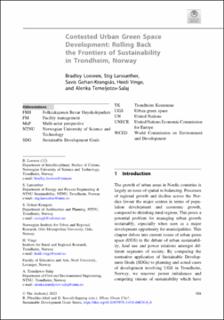| dc.description.abstract | Ongoing urban densification in Nordic regions raises sustainability trade-offs related to compactness, land use and urban green space. In Norway, green spaces comprising both natural and agricultural areas are highly valued cultural landscapes protected by the status of ‘green structure’. Yet, neoliberal development forces put pressure on urban green spaces, potentially exacerbating social inequalities and challenging governance structures formally oriented towards sustainability. In the case of Trondheim, Norway, competing priorities under development pressures unfold in the upholding of urban green space strategies and public values between core and periphery areas. Based on interviews, popular media and policy analysis, this contribution uses the multi-actor perspective to compare two current cases of urban development in green areas in terms of shifting public discourses. The first covers development in the urban fringe, where land reserved for agricultural use succumbs to suburban development pressure. The second turns to development in urban green space at the central university campus, used by the public for parkland and recreation, which bowed to public pressure. The examples point to differing values regarding urban green space in core versus periphery areas that materialise in public opposition, triggering debate and institutional review. Compared to state and market sectors, the community sector is shown to be underrepresented in the processes shaping the development proposals, while citizen engagement is a determining factor in shifting public discourse. Results show the need for collaborative governance structures across sectors, using intermediaries, to support a deeper understanding and integration of multiple perspectives in the shaping and negotiation of local sustainability discourses. | en_US |

